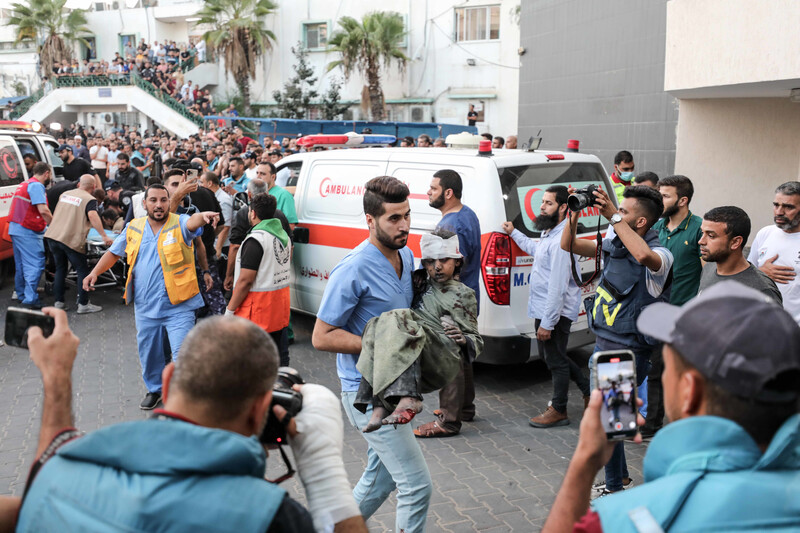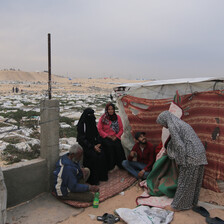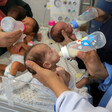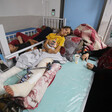The Electronic Intifada 8 December 2023

Amublance crews have been targeted during Israel’s genocidal war on Gaza.
APA imagesAl-Nasr pediatric hospital in northern Gaza is among the medical institutions which Israel has attacked over the past two months.
As well as taking care of patients, the hospital became a shelter for displaced people in the early stages of the current war.
A few weeks after the war began, al-Nasr hospital was subjected to heavy shelling. Shrapnel flew toward medical staff and the displaced.
Staff could not give adequate treatment to the wounded. Transferring patients to al-Shifa, Gaza’s largest hospital, was “kind of impossible,” Soher, a doctor at al-Nasr hospital, said.
“There was a fear that ambulances would be targeted.”
Around midnight on 6 November, the laundry department at al-Nasr hospital was hit by an Israeli airstrike.
“My heart dropped,” Soher said. “It was unimaginable – a hospital bombed directly.”
“I looked out the window,” she added. “Suddenly, the courtyard was full of dust. You could hear screams echoing everywhere. And the alarm barely stopped.”
Soher’s own family was taking refuge in the hospital at the time, as their home had been targeted. “The women were in a room, while the men were in a tent in the courtyard.”
Following the airstrike, Soher tried to locate her relatives.
“I quickly put on my white coat, covered my head and went straight down to check if any of them were injured,” she said. “I found my father, grabbed his hand and asked about everybody. He reassured me that they were fine.”
Once she had seen her dad, Soher, a fellow doctor and a nurse ran towards the emergency department. Reaching it involved running through the courtyard, which was under continuous shelling.
The scene at the emergency department was harrowing.
“I saw a decapitated female body and doctors trying to revive her sister nearby. I had to wrap a child’s wound with gauze despite how it needed stitches. There was no choice. A girl with an amputated arm and a woman with shrapnel in the chest needed a transfer to al-Shifa but it was impossible. All of this happened amid a communications blackout with no way to reach anyone, including ambulances.”
Despite the shelling, some families did succeed in calling ambulances from the neighboring Rantisi children’s hospital. Eventually, some wounded people were brought to al-Shifa.
Terrified
Many people were so terrified by what happened that they left the hospital. “They included my sister,” said Soher.
Soher’s husband Muhammad is an orthopedic surgeon working at al-Shifa. At times during the war, they have been unable to contact each other.
On 7 November – one day after the airstrike against al-Nasr hospital – the situation worsened considerably.
Israeli snipers spread around the hospital. The shelling intensified.
There was a scarcity of food and water. And the generators on which the hospital has relied for energy failed.
The following day, Israeli tanks hit wards where patients were being treated. Though there were no casualties, the oxygen supply was momentarily disrupted.
A child who required oxygen in the intensive care unit died.
This child was Yahia Shabet, a patient with muscular dystrophy.
I knew Yahia personally. He was being treated in Muhammad al-Durra hospital in eastern Gaza, where I worked as an intern earlier this year.
When al-Durra hospital came under attack during Israel’s current war. Yahia was transferred to al-Nasr.
With Israeli troops raiding al-Nasr, doctors could not remove Yahia’s body for burial. His body was left on an ICU bed for three weeks after Israeli troops forcibly evacuated the hospital.
A few other children died in the ICU following the evacuation.
On 9 November, everyone in al-Nasr hospital heard Israeli tanks getting closer. The shelling was indiscriminate.
“Later, two people attempted to leave, carrying a white flag,” Soher said. “But as soon as they reached the gate, they were brutally targeted. We started to appeal for evacuation. An Israeli officer called the hospital director and approved evacuation and said that ICU patients will be evacuated later by the Red Cross.”
The promise that the International Committee of the Red Cross would oversee the evacuation from the ICU turned out to be worthless.
“I couldn’t bear it”
The army ordered them to move from al-Ayoun Street in the Sheikh Radwan area of Gaza City, then towards southern Gaza, with their hands raised and holding white flags.
“This scene was agonizing,” Soher said. “My heart was choked by this humiliation. We stepped forward, and the brutal occupation forces opened fire. We stepped back and when we tried to step forward again, they fired again. Meanwhile, white phosphorus bombs were raining down.”
The patients finally succeeded in leaving as tanks surrounded the area. Everyone walked quietly.
They saw two people with white flags killed in the street.
“I couldn’t bear it all,” Soher said. “I cried a lot. I wished I could scream.”
As they walked down al-Ayoun Street, the evacuees were joined by people leaving two other nearby hospitals.
“The fear of being shot for no reason kept my heart racing.” Soher said. “We kept walking, raising our ID cards. Mine was with my husband, so I held the hospital ID card. The color of my ID card is green. My hospital ID card was blue.”
At one point, the army ordered everyone to stop. Soher heard an order for someone to come forward, with the person being identified by the color blue.
Soher thought that the soldier was referring to her ID card. But the order was directed at someone wearing a blue shirt.
On hearing the order, Soher threw away her ID card on the advice of a fellow doctor.
The long walk proved very challenging for Soher’s father, who is diabetic and has high blood pressure. He had to stop every so often for breaks.
As the sun set, the family managed to find a bus. It brought them to Bani Suheila, near the southern Gaza city of Khan Younis. Muhammad, her husband, was later evacuated from al-Shifa hospital and was able to join her in Khan Younis.
“We arrived at my friend’s house, where we are taking shelter,” said Soher. “I hugged my friend tightly and was in floods of tears. I had just spent a month under constant fire.”
“After a comforting warm bath, I sat chatting with Muhammad on my phone. My family went to bed early. But I couldn’t sleep. I stayed awake all night, trying to understand what was happening.”
Sewar Elejla was formerly a doctor at al-Shifa hospital in Gaza. She is now a Canada-based researcher.





